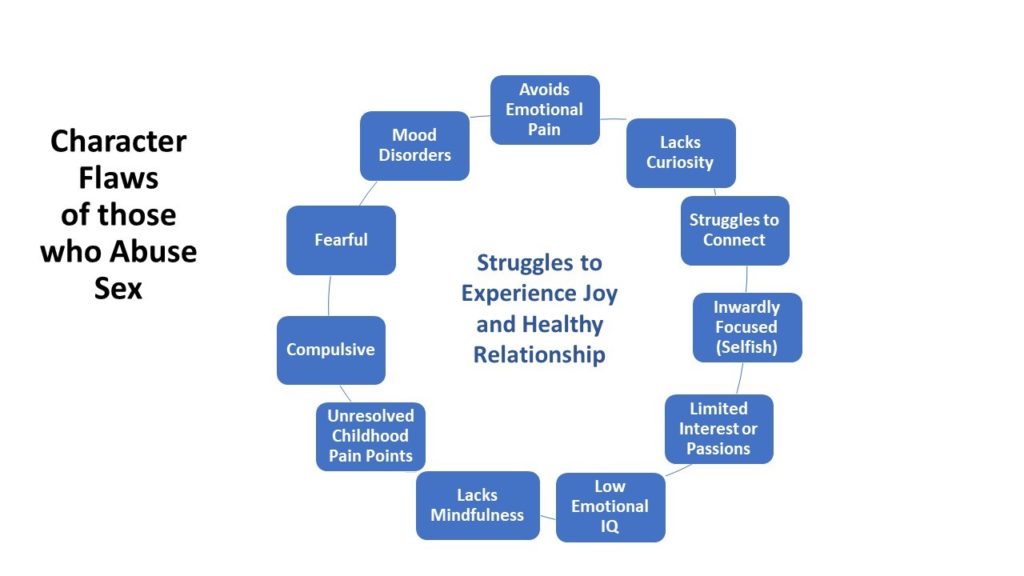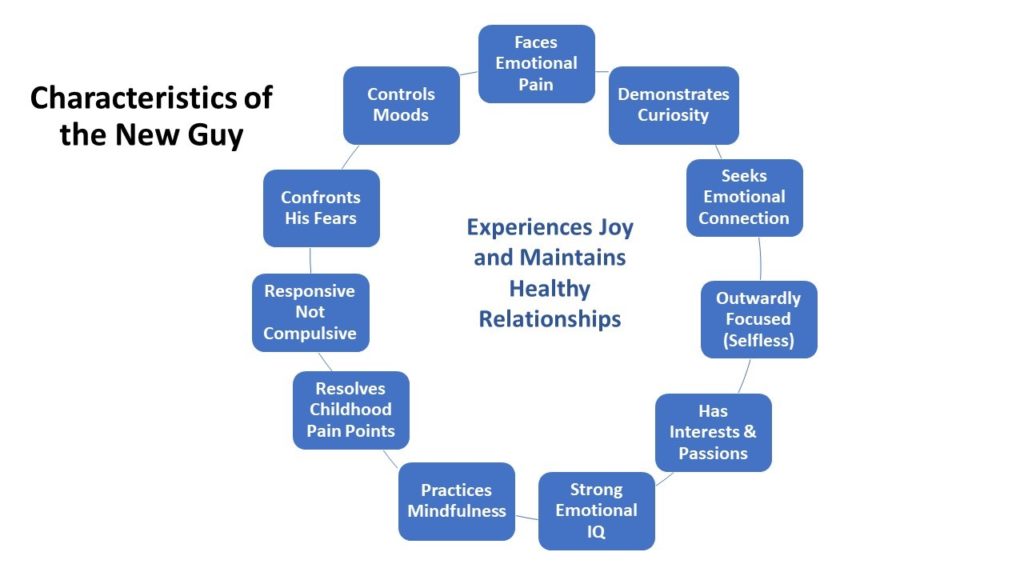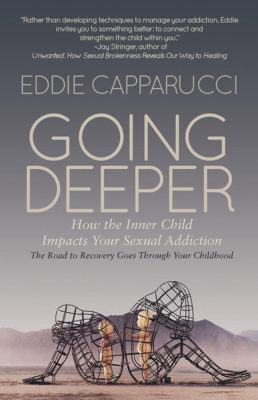By Eddie Capparucci, LPC, CSAS, CPCS
Click HERE for the entire four-part series.
This is the final installment of our four-part series, where we have been examining the need to go beyond treating a man’s sexual or pornography addiction and tackle the character issues that impact his ability to cultivate healthy relationships. This method of transformation is part of the Inner Child Recovery Process (ICRP) for the Treatment of Sexual and Pornography Addiction.
In our last article, we examined the character flaws of being Inwardly Focused, having Limited Interests or Passions, and possessing a Low Emotional IQ. In this final article, we will examine the last three flaws involving Lack of Mindfulness, Compulsive Nature, and Fearfulness, while also discovering how Unresolved Childhood Pain Points and Mood Disorders contribute to an individual’s inability to connect.

Lack of Mindfulness
A critical part of the ICRP is teaching individuals the art and benefits of being mindful. Mindfulness is being fully aware of your own experience in the present moment. And this is especially important when it comes to consistent evaluation of how we are feeling mentally, emotionally, physically, and spiritually. When individuals become depleted mentally, emotionally, physically, or spiritually, bad things can happen because the brain is screaming for stimulation or to numb-out.
Those struggling with addiction must learn to be mindful of emotional triggers, therefore allowing them to stay one step ahead of their addiction. Mindfulness also plays an essential role in helping individuals be more outwardly focused (which we discussed in the third part of this series). If you recall, individuals struggling with sex/porn addiction spend far too much time in their heads and, therefore, can be present but not engaged in the company of others. Mindfulness is an antidote for helping them become outwardly focused.
Compulsive Nature
Often individuals caught in the web of addictive behaviors will say their problem is due to habit. The habit involved in a sex/porn addiction is the compulsive nature of the disorder. To reduce compulsive actions, it is necessary to understand what leads to a man’s compulsiveness in the first place.
That is where developing insight into the “why” individuals do what they do becomes so important. Understanding the rationales that drive thinking, feelings, and behaviors provide those who struggle with addiction the ability to slow everything down when urges appear.
When an individual pauses to think before reacting, they are providing themselves with an opportunity to make more rational and healthy decisions. The ICRP shows individuals how to apply “speed bumps” into the addictive cycle to help them slow down compulsive reactions.
Fearfulness
Perhaps you have already noticed fear is at the heart of each of the flaws we are reviewing. Fear is the driver for those who engage in addictive behaviors, especially when it comes to facing their emotional pain. There is a fear of being swept away in the emotional onslaught of distress if they look back at past traumas and/or neglect. Therefore, individuals may feel that it’s best to continue to stuff the pain and use escape mechanisms such as addictive behaviors. The same issue prevents taking risks or attempting to nurture relationships. The fear of being rejected or getting in trouble for not knowing the right things to say keeps these individuals on the sideline, much to the disappointment of their partners.
With the ICRP, individuals come to understand their fear resides in their inner child, who continues to be haunted by past pain points. By identifying with their inner child and understanding his fears, individuals can become more empowered and learn to face their fears head-on. This occurs by learning to manage the inner child’s fear and helping to soothe his discomfort using rationale insight and wise-mind to resolve the child’s emotional conflict.
Instead of the inner child running the show and hijacking individuals into addictive behaviors, individuals have the newfound ability to make healthy decisions. This process allows them to take an extremely active role in managing the core emotional triggers that lead to their acting out in destructive ways. By learning the skills necessary to face their emotional pain head-on, these individuals limit the need to escape into harmful addictive behaviors.
Unresolved Childhood Pain Points
A large percentage of individuals who deal with sexual and pornography addiction have suffered childhood trauma and/or neglect. This can range from absent or abusive parents to being bullied by peers or siblings. In nearly all cases, these individuals did not have the skill set or support system required to deal with this tremendous emotional pain, so, therefore, they came up with the solution of “I won’t think about it.” And to accomplish that, they learned to distract themselves by escaping. Now, as an adult, they still seek to escape by using destructive sexual behaviors.
An essential part of overall recovery and character transformation is to resolve past childhood pain points. This is not an easy task since many of these individuals don’t possess memories of their childhood or refuse to recognize any adverse circumstances in their upbringing in fear of dishonoring their parents.
If unresolved childhood pain points continue to go untreated, the chances of successful recovery and transformation remain low.
Mood Disorders
The final issue we will address is the prevalence of mood disorders suffered by many who deal with sex and/or addictions. The primary disorders are anxiety and depression. In many cases, individuals raised in chaotic or neglectful home settings suffered from anxiety at a young age. However, over the years, their anxiety has been such a constant in their lives that they no longer recognize the internal stress. When encouraged to become more mindful of what their body is telling them, as well as their emotional state, these men begin to recognize their suppressed anxiety.
Depression, which is a cousin to anxiety, comes with feelings of emptiness, sadness, and gloom. Anxiety elevates your emotional state, while depression brings it to a claw. Anxiety and depression among those struggling with addiction is a cycle. After becoming anxious, an individual starts to worry and feel sad, therefore moving into a depressed state. Back and forth, mood swings can fuel addictive behaviors and should be addressed utilizing therapy and, in some cases, medication. Controlling depressive and anxiety disorders can not only assist in managing addictive behaviors but also can improve overall relationships.

* * * * *
 Eddie Capparucci is a Christian therapist and licensed by the State of Georgia. Certified in the treatment of sexual and pornography addiction, and he and his wife, Teri, have a private practice working with men struggling with sexual and pornography addictions, as well as their wives who are dealing with betrayal. Among his many clients, Eddie has worked with professional athletes, including NFL and MLB players and television personalities.
Eddie Capparucci is a Christian therapist and licensed by the State of Georgia. Certified in the treatment of sexual and pornography addiction, and he and his wife, Teri, have a private practice working with men struggling with sexual and pornography addictions, as well as their wives who are dealing with betrayal. Among his many clients, Eddie has worked with professional athletes, including NFL and MLB players and television personalities.
He is the creator of the Inner Child Recovery Process for the treatment of Sexual and Pornography addiction. This unique treatment method helps individuals get to the root issues of their addiction and provides them with the tools and insight to manage the disorder. It has been endorsed by many leaders in the sex addiction field. You can find out more about it at www.innerchild-sexaddiction.com. The Inner Child Recovery Process is the subject of his new book, Going Deeper: How the Inner Child Impacts Your Sexual Addiction. He also is the host of the webcast entitled Getting to the Other Side: Helping Couples Navigate the Road to Recovery.
